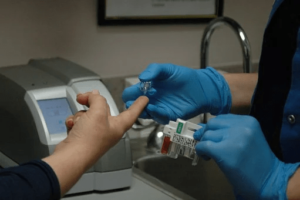Everyone has inherited the combination of a unique gene from their parents. This genes complexity is the reason behind what influences people’s lives.
This original gene structure explains and differentiates one person from another in terms of physical appearance, sensitivity towards particular food and treatment, and the possibility of developing certain diseases.
Let’s look at what is genetic testing and how is genetic testing done.
What is Genetic Testing?
Genetic testing is done on blood, hair, saliva, amniotic fluid, or other body tissues samples. The purpose of the test is to identify a person’s susceptibility to developing certain diseases. Here is a list of all the reasons that genetic testing can be done for:
- To diagnose a disease.
- To learn the cause of a disease.
- To start treatment for a disease.
- To find and prevent your risk of getting a specific disease.
- To find the risk of inheriting the disease from parents.
- To screen your embryo, fetus, or baby.
Procedures Involved in Genetic Testing
Genetic testing requires a proper procedure from doctor recommendation to preparing DNA and samples, analyzing and interpreting samples to the final results. There are many types of genetic testing done for different purposes
Here is genetic testing examples or step-by-step procedure:
1- Doctor Appointment
Once your doctor discusses everything from tests to insurance coverage of cost and risk involved, you might be required to sign the consent letter.
The lab will collect samples from you that can include saliva, blood, skin, hair, and fluid around the fetus from a pregnant woman.
The sample then proceeded to the lab for a test.
2- DNA Preparation
The lab used the sample to get DNA. Depending on the types and complexity of the genetic test, the lab runs different tests to find the risk or symptoms of the disease.
3- Sequencing
The sequencing DNA test collects detailed and specific gene variants in the DNA that might influence or trigger the disease. The human genome is like a collection of reports or books that contain all information about individual genes.
A machine is used for the process called DNA sequencer to look for genes variants.
4- Analyzing and Interpreting the DNA
The machine collects data that can be seen and checked through computers. Computers compare DNA with the human body genome.
A report is conducted on tests done on DNA variants. Everyone has DNA variants, but not all variants can cause disease. The experts at the lab then proceed with the results and analyze the variants that can cause illness.
To conclude anything, the experts look at DNA results, variants, and family history to find the potential disease risk.
The lab team can find the cause of the disease and prepare the result, but sometimes it can’t find any reason or symptoms due to an unsequenced test on some part of DNA or not having enough knowledge about specific variants.
5- The Results
Based on lab testing, the doctor received reports or results from experts—your doctor can explain the results to you and answer your question regarding the outcome.
Your doctor might need to run more tests (genetic or medical) based on results.
How Long Does it Take to Complete Genetic Testing?
Generally, it takes around 2 to 3 months to complete the genetic testing. However, commercial labs tend to work faster and provide reports within a month, about 3 to 4 weeks.
Sometimes results come to your doctor or counselor, who later reports them to you. Make sure to check with the lab and ask your doctor how long it will take for the results to come.
What Can You Do With The Results?
Your doctor or consultant will talk to you about test results and what you plan to do in the future. With your concerns, they move forward and start treatment in case the result is positive. If the test indicates more severe health risks such as cancer, your doctor can begin intensive treatment immediately.
Some preventive treatments also include frequent screening and surgery to remove cancer from the body and proper medication.
If the result comes out negative or uncertain, the best thing is to adopt healthy lifestyle changes after consulting with your doctor. Because a negative test result doesn’t mean you can never have a specific disease. Staying on the safe side by adapting healthy shifts in routine can help prevent the condition in the future.
What Are the Uses of Genetic Testing?
Genetic testing is helpful in many ways for your and your family’s medical care requirements.
It can provide information about genetic conditions such as the risk of developing cancer or Fragile X.
1- Predictive Genetic Testing
Predictive genetic testing is helpful to identify the chance or symptoms of developing a potential disease. The test looks for potential risk even if no family member has the same disease history.
Predictive testing is primarily helpful for predicting adult-onset health issues such as cancer, genes disorder, and cardiovascular disease.
2- Presymptomatic Genetic Testing
Presymptomatic genetic testing is helpful to look into the genes mutation that is the reason behind disorders determined at the birth of a child or later in their life.
Unlike predictive genetic testing, the test is helpful for people who have a family member with the same genetic disorder.
Before symptoms appear, presymptomatic genetic testing can identify many diseases, such as hereditary hemochromatosis and iron overload disorder.
3- Diagnostic Testing
Diagnostic testing is conducted to determine the chromosomal condition. A doctor can recommend this test based on the symptoms of a particular disease.
Diagnostic testing can also be performed before birth to find out potential health risks to the fetus. However, this testing is only limited to some types of genes or genetic conditions.
4- Newborn Screening
Newborn screening usually helps public health programs to find genetic disorders in children for early treatment.
In the United States, millions of children are tested each year. States must try babies for a set of 35 conditions on the recommendation of the U.S. Health Services and Resource Administration.
5- Prenatal Testing
Prenatal screening is genetic testing before pregnancy that helps identify chromosomes or genes mutations in the fetus. This test is conducted during pregnancy if the doctor finds a child’s risk of developing a specific genetic or chromosomal disease.
The test can not identify all types of inherited disorders but can aid the couple in deciding about pregnancy and remove uncertainty.
6- Carrier Testing
Carrie testing is helpful to find out if the person copy of an altered gene that can cause a particular disease. The chance of illness is double if the person has two copies of the same altered gene. So, if both parents have one autosomal recessive, the opportunity for a child to adopt the disease is about 25 % to develop that disease.
The test recommends that people who have a family history or are from a specific ethnic group are more likely to develop this genetic disorder.
Things to Consider Before Option for a Genetic Test
Your doctor or counselor can recommend the test but remember it is a voluntary choice; you are not obliged to do the genetic testing if you don’t want to.
But if you do decide on getting genetic testing done, then start with gathering family medical history. Have a clear counting session with your doctor and ask all the questions in your mind before you agree to move with the test.
There are many benefits of genetic testing as well as risks. It helps identify the disease and adopt early treatment, but it can cause severe stress and anxiety.
Testing doesn’t eliminate the chance of developing the disease. It just predicts the potential risk, so only proceed with the test if you are mentally prepared for it.
FAQs: How is Genetic Testing Done & What Should You Expect
1- How long does genetic testing take?
There is no set time for how long genetic testing results take. However, you can expect a minimum of 3 to 4 weeks. Some commercial labs take less time, around two weeks.
2- How do you test for genetic disorders?
DNA tests and blood tests are the two most common ways of testing genetic disorders. A specific test of blood enzymes called biochemical genetic testing is also used for diagnosis.
3- How expensive is genetic testing?
The cost of genetic testing is different depending on the type of lab and the nature of the genetic test. The average minimum cost is 100$, and the maximum is $2,000.
4- Is genetic testing a good idea?
Genetic testing can be good for someone who is healthy and can overcome symptoms. However, most of the time, it causes more anxiety over the diagnosis or possibility of disease.
5- How is genetic testing done during pregnancy?
The genetic test Amniocentesis is done for the pregnant woman by inserting a needle into the abdomen to remove amniotic fluid around the fetus. The test is usually done between 15 or 20 weeks of pregnancy.
6- What diseases can genetic testing find?
Celiac, Bipolar disorder, Breast and ovarian cancer, Parkinson’s disease, AMD, Age-related macular degeneration, obesity, and psoriasis are some diseases that can be found by running a genetic test.
Conclusion: Take Control of Your Health With Genetic Testing
Once you talk to your doctor and are ready for the test asl some questions like:
- Will the results of the test have consequences for other members of my family?
- Should I discuss the test with them first?
- How might the results affect my family and me emotionally?
- Are there any support services or patient organizations I can contact?
Before getting genetic testing, you should do your research. After all, what matters is your health, and you should not hesitate to ask your consultant or doctor about any concerns or questions you have, whether it is related to the test or the cost of the test.





